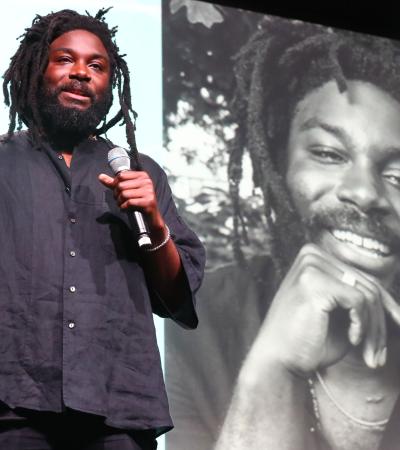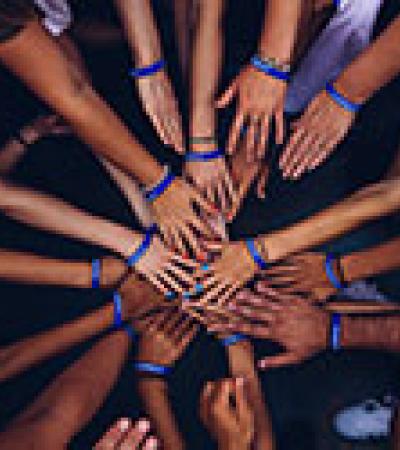The 2019 American Association of School Librarians (AASL) National Conference was held in Louisville, Ky., in November. While the weather in Louisville was decidedly frosty, the atmosphere in the convention center was warm and enthusiastic.
A theme that carried through the conference was inclusion. In its Shared Foundations, the new AASL Standards emphasize the need for school libraries to "demonstrate an understanding of and commitment to inclusiveness and respect for diversity in the learning community."
In this blog post, we'll share a few key takeaways from the AASL Conference that helped put the Shared Foundation "Include" in context.
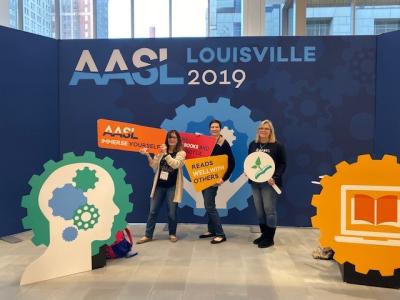
Books and diversity
In her keynote address, Ellen Oh, author, co-founder and president of We Need Diverse Books, discussed the connections and experiences that genuine, diverse characters provide to students to their lives and the lives of others.
Students need to see themselves in the books they read, Oh said, but they also learn about people and worlds different than their own. “Diverse books are for everyone," she said. "If we don’t provide them, we aren’t allowing them to hear positive stories of those different than us."
Oh talked about her children and their need to see themselves in books. (She explained that she had their permission to share her kids' stories.) As a child, her daughter expressed how she wanted stories where girls could be heroes, where the hero could look like her. This was the reason that Oh started writing: so her own children could see themselves in books.
The discussion with Oh continued on Friday with another session, "Practical Approaches to the Shared Foundation 'Include': A Conversation with Ellen Oh and AASL’s Emerging Leaders." A conversation on supporting and promoting a diverse collection raised an interesting discussion: how to teach "the classics."
“If you are going to teach the classics, then you need to teach the problems surrounding those classics," Oh said. For example, make sure your discussion of some of the "great American novels" includes topics like racism and the white savior complex.
We left the "Practical Approaches" session with two exciting resources to explore:
- Project Lit Community is a literary movement committed to increasing access to culturally relevant books and promoting a love of reading. Educators can apply to be a Project Lit chapter leader. Once accepted access will be provided to programming resources and a community that will help develop a strategy for your library community to develop access to a diverse collection.
- Reading without Walls challenges students to read books about characters who look or live differently than themselves, or on topics not yet discovered, or formats that have yet to be tried. Provided on the site is an activity guide with supporting programming ideas.
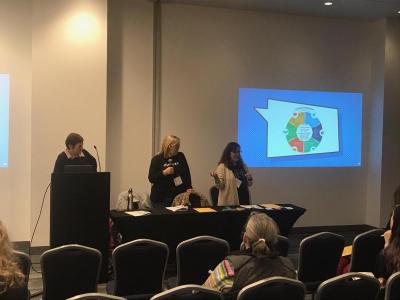
Programming for inclusion
Later in the conference, we presented, along with our colleague Marianne Fitzgerald of Anne Arundel County Public Schools, about how the AASL standards and the Teaching Tolerance Social Justice standards integrate. By utilizing both sets of standards, we explained, school librarians can ensure that every student passing through our library doors feels valued and included.
Programming ideas that we shared with our audience included:
- Taking the time to start the year with building a library community.
- Spend time reading books with diverse characters who are engaging in their everyday lives.
- Create programming in your library around letting students find books that allow them to see windows and mirrors into their worlds and the worlds of others.
- Collaborate with your content area teachers to integrate Teaching Tolerance lessons into your library spaces.
Literature and social justice
Another session that related back to the AASL "Include" standard was "Using Literature as a Spark for Social Justice." This session included an inspiring panel of authors: India Hill Brown, "The Forgotten Girl"; Saba Syed, "An Acquaintance": Rafi Milttlefehldt, "What Makes Us"; and Najiyah Maxfield, "Sophia's Journal."
The authors discussed not just the empathic awareness that literature can provide but also how literature can spark activism. The central theme of this panel presentation was that literature goes beyond mirrors, windows and doors — engaging literature can inspire teens to be change agents. A repeated message was: “Stories are powerful ways to allow ourselves to walk in someone else’s shoes, understand different points of view and to find inclusivity in the library.
“Nothing affects your worldview like a story," Maxfield said.
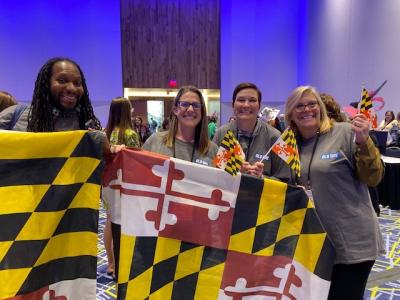
A rainbow of characters
Amanda Melilli from University of Nevada Las Vegas works with pre-service teachers and librarians to promote the inclusivity of LGBTQIA+ materials in education. She presented a session titled "LGBTIA+ Resources for Young People Library Guide."
LGBTQIA+ materials are one of the most challenged set of books in the country, Melilli said. But as librarians we need to realize the educational value of these materials and incorporate materials that feature LGBTQIA+ characters into our collections.
To be successful in building and using our collections, Melilli said, the first we need to understand and know our own communities. Take small steps. Be deliberate in your incorporation of LGBTQIA+ books into your collection, and recognize that it does not happen overnight.
Melilli suggested starting with curated displays, including books each month that include all. Our takeaway from this session: Our collections and programming need to reflect multiple identities. The heroes need to be authentic. LGBTQIA+ books should entertain, empower, comfort, educate, and inspire.
The programming audience for these books: EVERYONE!

